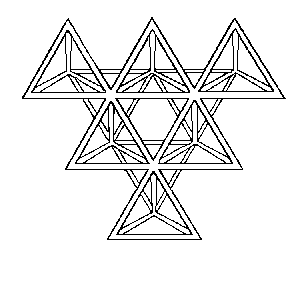"The Devil's supreme achievement is that nobody believes in him. There is a Deity, certainly, but one to be seen within the terms H.G.Wells suggested, that when man cries out his little 'gimme, gimme, gimme', it is as if a leveret snuggled up to a lion on a dark night. The Old Testament and other sacred literatures of the world may not, after all, be superseded rubbish. These are some of the old ideas Doris Lessing uses in her new and audacious history of the earth. It could be called a star's eye view of things, energetically encompassing millions of years of evolution from the time of life's beginnings in the warm swamps to man's near-extinction in the Third -- and last -- World War, soon to be upon us. This war is Shammat's (the Devil's) victory, but also his defeat; optimism can be defined as the ability to believe that one per cent of mankind may survive the wrath to come for a new start under the guidance of The Great Ones who bide Their Times. They watch, and wait, and monitor and adjust human development -- employing, for instance, a judicious introduction of celestial genes in crucial epochs, or a supply of Messengers and Technicians whose task it is to warn and to instruct.
"In the extraordinary career of Doris Lessing no work has been more ambitious or more startling. Shikasta refuses to be confined within the "Western' view of history and culture, suggesting that "the West' is not necessarily seen by other cultures as flatteringly as it sees itself. Can it be classed as space fiction? Perhaps as 'sociological space fiction', that hybrid genre which takes present or potential social and psychological possibilities to their logical conclusions so that we may examine them, and with determination refuse, or modify, and master them.
"Those who have followed Lessing's evolution as a writer will recognize in this first book of her visionary novel-sequence, Canopus in Argos: Archives , certain of her old preoccupations transformed and developed on this space-age stage of star-Empires, evolving or dying or damaged planets, celestial management (or mismanagement), the givers of good for mankind and the wicked ones from the thieving planet that preys on us.
"This book has in it nothing of 'permissiveness', or the hope that everything will come all right in the end: it is a return to the older and even traditional concepts of a timeless confrontation between good and evil, dark and light. It is a vision so striking and so powerful that it is certain to be recognized as one of the major works of modern fiction." [jacket blurb, UK hbk, 1979]
"In the grand tradition of Olaf Stapledon, Doris Lessing offers us a cosmic viewpoint on our 'condition'. But this novel sequence is much more ambitious than Starmaker . Lessing attempts to wed many of the 'accepted' metaphysical tales and origin myths into one cohesive story -- yet told on many levels. A task which inevitably begs the ultimate in critiques... and Lessing does a damn good job of it." --Henry W.Targowski (in Mark/Space , 1995).
Cosmological wonder.
 Book 1 of the 'Canopus in Argos: Archives' quintet: Shikasta , The Marriages Between Zones Three, Four, and Five , The Sirian Experiments , The Making of the Representative for Planet 8 , and The Sentimental Agents .
Book 1 of the 'Canopus in Argos: Archives' quintet: Shikasta , The Marriages Between Zones Three, Four, and Five , The Sirian Experiments , The Making of the Representative for Planet 8 , and The Sentimental Agents .
Highly recommended.
Additional Links
*note: Please let me know of any online reviews or articles concerning this book (include page Title, URL, Author, and brief Description).
Of Related Interest
|
|
|
hwt@anachron.demon.co.uk

Return to Mark/Space